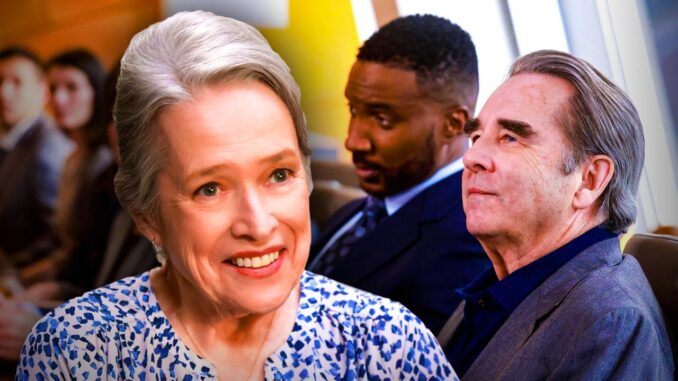
Matlock 2025: A Legal Eagle in a Drone-Filled Sky
The familiar theme song, a gentle piano melody that hinted at both folksy wisdom and steely determination, now reverberated through the sleek, minimalist office. Matlock, 2025, was back, but stepping into his Atlanta law practice was less like revisiting a cherished 80s classic and more like entering a meticulously reimagined version of it, one where the past was a comforting echo in a hyper-connected, technologically advanced world. The changes, while subtle at first glance, ran deeper than the replaced rotary phone or the absence of a landline.
One of the most striking differences was in the very nature of the cases Ben Matlock, now portrayed as a seasoned lawyer embracing his twilight years with a mischievous glint in his eye, accepted. In the original series, Matlock often tackled seemingly straightforward murder mysteries, unraveling intricate webs of personal vendettas and hidden secrets within tight-knit communities. These were narratives steeped in human fallibility and the emotional turmoil of everyday life. 2025 Matlock, however, grappled with cases that mirrored the complex anxieties of the modern age. He found himself navigating the murky waters of AI bias in criminal sentencing, challenging the legality of autonomous vehicle accidents, and defending whistleblowers exposing corporate negligence in the development of genetically modified food. The cases were less about "whodunit" and more about "whosresponsible," reflecting a societal shift towards systemic accountability in a world increasingly shaped by algorithms and technological advancements.
The investigative process, too, had undergone a dramatic transformation. Gone were the days of relying solely on hunches, gut feelings, and painstakingly pieced-together physical evidence. 2025 Matlock harnessed the power of big data analytics, predictive policing algorithms, and sophisticated surveillance technology to uncover crucial leads. He utilized virtual reality reconstructions of crime scenes, analyzed drone footage with forensic precision, and even consulted with AI experts to decipher encrypted communications. While the original Matlock was a master of cross-examination, relying on his sharp wit and unwavering logic to corner witnesses, the 2025 version was equally adept at interrogating digital data, finding loopholes in complex algorithms, and exposing the inherent biases embedded within the very systems designed to uphold justice.
The supporting characters, while retaining echoes of their predecessors, were also updated for the 21st century. Tyler Hudson, the young, ambitious protégé of the original series, was replaced by Dr. Anya Sharma, a forensic data scientist with a penchant for hacking and a deep understanding of artificial intelligence. Her expertise proved invaluable in navigating the technological labyrinths of modern crime, providing Matlock with a critical perspective on the digital footprint left behind by perpetrators. Similarly, Michelle Thomas's role as a charming and resourceful investigator was now embodied by Kai Nguyen, a cybersecurity specialist with a knack for uncovering hidden online identities and tracking digital trails. These characters weren't just sidekicks; they were integral to Matlock's ability to unravel the complexities of modern crime, reflecting the collaborative nature of problem-solving in a tech-driven world.
Furthermore, the portrayal of law enforcement had shifted considerably. The original Matlock often found himself at odds with local police forces, relying on his own intuition and investigative skills to uncover the truth that eluded them. In 2025, the relationship was more nuanced. While skepticism still existed, the series explored the challenges faced by law enforcement agencies grappling with the ethical and practical implications of emerging technologies. Matlock often found himself working alongside law enforcement, providing them with the technological expertise and legal guidance they needed to navigate the uncharted territories of digital crime, highlighting the growing need for collaboration between legal professionals and tech experts in the pursuit of justice.
However, amidst all these technological advancements, the heart of Matlock remained unchanged. The series still championed the underdog, fought against injustice, and upheld the principles of truth and fairness. Matlock's signature rumpled suit, his unwavering belief in the power of due process, and his unwavering commitment to his clients served as a comforting reminder of the core values that made the original series so enduring. Even in a world saturated with data and algorithms, the 2025 Matlock understood that justice still hinged on the fundamental principles of empathy, integrity, and a deep understanding of human nature.
In conclusion, Matlock 2025 was not merely a nostalgic reboot, but a thoughtful reimagining of a beloved character for a new era. It acknowledged the profound impact of technology on the legal landscape, exploring the ethical dilemmas and societal anxieties that accompanied its rapid advancement. While the methods and tools had evolved, the fundamental principles of justice and the unwavering spirit of Ben Matlock remained the same, proving that even in a drone-filled sky, the pursuit of truth could still be guided by the sharp mind and compassionate heart of a legal eagle. The show served as a potent reminder that technology should serve humanity, not the other way around, and that even in the face of overwhelming complexity, the human element remains crucial in the pursuit of justice.
